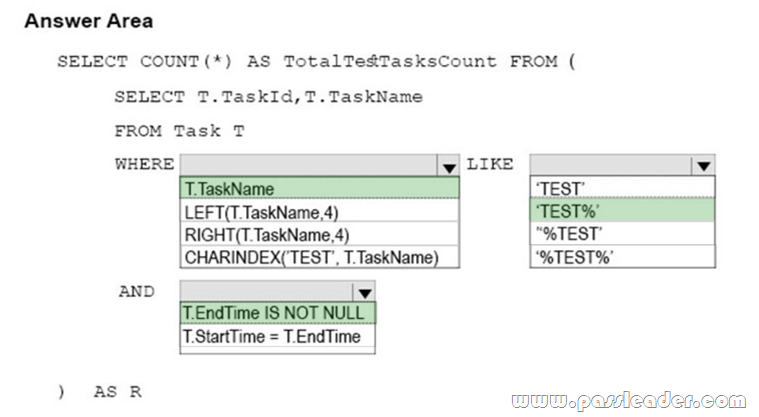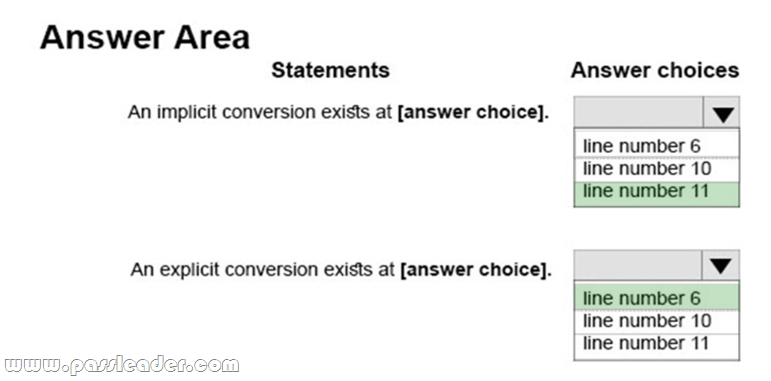Valid 70-761 Dumps shared by PassLeader for Helping Passing 70-761 Exam! PassLeader now offer the newest 70-761 VCE dumps and 70-761 PDF dumps, the PassLeader 70-761 exam questions have been updated and ANSWERS have been corrected, get the newest PassLeader 70-761 dumps with VCE and PDF here: https://www.passleader.com/70-761.html (135 Q&As Dumps –> 171 Q&As Dumps –> 215 Q&As Dumps)
BTW, DOWNLOAD part of PassLeader 70-761 dumps from Cloud Storage: https://drive.google.com/open?id=0B-ob6L_QjGLpaEZzRVFnOE9OenM
NEW QUESTION 125
You need to create a database object that meets the following requirements:
– accepts a product identifies as input
– calculates the total quantity of a specific product, including quantity on hand and quantity on – order
– caches and reuses execution plan
– returns a value
– can be called from within a SELECT statement
– can be used in a JOIN clause
What should you create?
A. a temporary table that has a columnstore index
B. a user-defined table-valued function
C. a memory-optimized table that has updated statistics
D. a natively-complied stored procedure that has an OUTPUT parameter
Answer: B
Explanation:
A table-valued user-defined function can also replace stored procedures that return a single result set. The table returned by a user-defined function can be referenced in the FROM clause of a Transact-SQL statement, but stored procedures that return result sets cannot.
https://technet.microsoft.com/en-us/library/ms191165(v=sql.105).aspx
NEW QUESTION 126
Drag and Drop
You have a database containing the following tables:
Servers

Errors

You have a user-defined, scalar function named IPLookup that takes a DNS name as a parameter and returns the IP address of the server. You have an additional user-defined, scalar function named DNSLookup, that takes an IP address as a parameter and returns a DNS name. You create a view named vwErrors by running the following Transact-SQL statement:

You need to insert data by using the view. How should you complete the Transact-SQL statement? (To answer, drag the appropriate Transact-SQL segments to the correct location. Each Transact-SQL segments may be used once, more than once, or not at all. You may need to drag the split bar between panes or scroll to view content.)

Answer:

Explanation:
https://docs.microsoft.com/en-us/sql/t-sql/queries/output-clause-transact-sql
NEW QUESTION 127
Hotspot
You query a database that includes two tables: Project and Task. The Project table includes the following columns:

The Task table includes the following columns:

Users report performance issues when they run the following query:

You need to improve query performance and limit results to projects that specify an end date. How should you complete the Transact-SQL statement? (To answer, select the appropriate Transact-SQL segments in the answer area.)

Answer:

Explanation:
Wildcard character %: Any string of zero or more characters. For example: If the LIKE ‘5%’ symbol is specified, the Database Engine searches for the number 5 followed by any string of zero or more characters.
https://docs.microsoft.com/en-us/sql/t-sql/language-elements/like-transact-sql
NEW QUESTION 128
You are building a stored procedure that will update data in a table named Table1 by using a complex query as the data source. You need to ensure that the SELECT statement in the stored procedure meets the following requirements:
– Data being processed must be usable in several statements in the stored procedure.
– Data being processed must contain statistics.
What should you do?
A. Update Table1 by using a common table expression (CTE).
B. Insert the data into a temporary table, and then update Table1 from the temporary table.
C. Place the SELECT statement in a derived table, and then update Table1 by using a JOIN to the derived table.
D. Insert the data into a table variable, and then update Table1 from the table variable.
Answer: B
Explanation:
Incorrect:
Not A: CTEs do not have dedicated stats. They rely on stats on the underlying objects.
Not C: Unlike a derived table, a CTE can be self-referencing and can be referenced multiple times in the same query.
https://technet.microsoft.com/en-us/library/ms190766(v=sql.105).aspx
https://dba.stackexchange.com/questions/13112/whats-the-difference-between-a-cte-and-a-temp-table
NEW QUESTION 129
You have a disk-based table that contains 15 columns. You query the table for the number of new rows created during the current day. You need to create an index for the query. The solution must generate the smallest possible index. Which type of index should you create?
A. clustered
B. filtered nonclustered with a getdate() predicate in the WHERE statement clause
C. hash
D. nonclustered with compression enabled
Answer: B
Explanation:
A filtered index is an optimized nonclustered index especially suited to cover queries that select from a well-defined subset of data. It uses a filter predicate to index a portion of rows in the table. A well-designed filtered index can improve query performance as well as reduce index maintenance and storage costs compared with full-table indexes. Creating a filtered index can reduce disk storage for nonclustered indexes when a full-table index is not necessary.
https://docs.microsoft.com/en-us/sql/relational-databases/indexes/create-filtered-indexes
NEW QUESTION 130
Hotspot
You need to develop a Transact-SQL statement that meets the following requirements:
– The statement must return a custom error when there are problems updating a table.
– The error number must be the value 50555.
– The error severity level must be 14.
– A Microsoft SQL Server alert must be triggered when the error condition occurs.
Which Transact-SQL segment should you use for each requirement? (To answer, select the appropriate Transact-SQL segments in the answer area.)

Answer:

Explanation:
https://msdn.microsoft.com/en-us/library/ms178592.aspx
NEW QUESTION 131
Hotspot
You have two tables as shown in the following image:

You need to analyze the following query. (Line numbers are included for reference only.)

Use the drop-down menus to select the answer choice that completes each statement based on the information presented in the graphic.

Answer:

Explanation:
To compare char(5) and nchar(5) an implicit conversion has to take place. Explicit conversions use the CAST or CONVERT functions, as in line number 6.
https://docs.microsoft.com/en-us/sql/t-sql/data-types/data-type-conversion-database-engine#implicit-and-explicit-conversion
NEW QUESTION 132
Drag and Drop
You have a database containing the following tables:
Servers

Errors

You have a user-defined, scalar function named IPLookup that takes a DNS name as a parameter and returns the IP address of the server. You have an additional user-defined, scalar function named DNSLookup, that takes an IP address as a parameter and returns a DNS name. You create a view named vwErrors by running the following Transact-SQL statement:

You need to insert data by using the view. How should you complete the Transact-SQL statement? (To answer, drag the appropriate Transact-SQL segments to the correct location. Each Transact-SQL segments may be used once, more than once, or not at all. You may need to drag the split bar between panes or scroll to view content.)

Answer:

Explanation:
https://docs.microsoft.com/en-us/sql/t-sql/queries/output-clause-transact-sql
NEW QUESTION 133
……
Get the newest PassLeader 70-761 VCE dumps here: https://www.passleader.com/70-761.html (135 Q&As Dumps –> 171 Q&As Dumps –> 215 Q&As Dumps)
And, DOWNLOAD the newest PassLeader 70-761 PDF dumps from Cloud Storage for free: https://drive.google.com/open?id=0B-ob6L_QjGLpaEZzRVFnOE9OenM